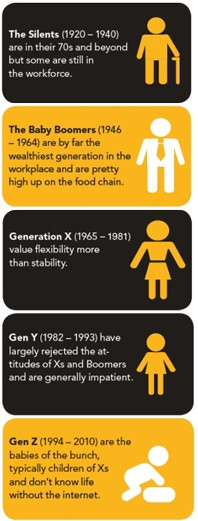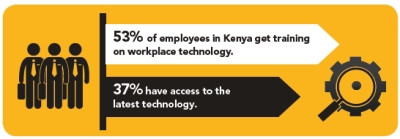
As companies transform themselves to respond to profound market changes, they need to develop workforces with the skills and motivation to carry their organisations into the future. But profound global shifts in the geography and demographics of labour - and the growing war for talent - are forcing firms to rethink ways to find, retain and engage their most valuable resource: people," says SAP southern Africa senior communications manager Ansophie Strydom.
Strydom was speaking at the launch of a recently-released Oxford Economics survey, dubbed Workforce 2020, sponsored by SAP, on the state of readiness of organisations to create and engage a diverse global workforce.
"Technology plays a key role," she says. "It can help drive worker productivity, collaboration and engagement while providing CHROs and other CXOs with improved analytics to drive transformative HR strategy.
At the same time, technology skills will be essential for workers as IT influences the creation of new jobs and job requirements." The study covers 27 countries, seven industries, 2 700 executives and 2 700 employees, of which half of the respondents are millennials. That is relevant because, for the first time, four generations, and in some cases five, are in the workforce simultaneously. This means four or five different ways of thinking, working and communicating.
Workplace ADHD
The Silents, Baby Boomers, Generation X, Generation Y and Generation Z are as diverse a bunch as you could hope for. The Silents (born between 1920 and 1940) are in their 70s and beyond, but some are still in the workforce, says Gill Lindsell, internal communications manager at SAP Africa.
The Baby Boomers (1946 - 1964) are by far the wealthiest generation in the workplace and are pretty high up on the food chain. They remember life before PCs and touchscreens and are therefore a little technologically challenged, preferring face-to-face interactions. Generation X, she says, born between 1965 and 1981, "value flexibility more than stability - but not quite as much as Ys. They value family and personal relationships more than Boomers. Xs work well independently and have a rough time figuring out how to deal with the Ys, who seem to want constant attention. The Xs are also waiting impatiently for the Boomers to leave the building."
Gen Y (1982 - 1993), on the other hand, "have largely rejected the attitudes of Xs and Boomers and are generally impatient. They don't think in terms of loyalty, and workplace flexibility is a must. They want mentors and easy access to management; they also want informal feedback and constant recognition. They tend to suffer from workplace ADHD."
Both millennials (39%) and non-millennials (33%) prioritise the meeting of their income goals.
The babies of the bunch, generation Z (1994 - 2010), "are typically children of Xs and don't know life without the internet.
They're completely dependent on and comfortable with, technology, which is why they're sometimes called 'digital natives'. As in tune as they are with technology, they, sadly, aren't very good with faceto- face communication, which proves to be a challenge."
Only 44% of employees say leadership at their companies is equipped to lead their organisations to success.
All of the above in one workplace provides challenges and opportunities that most organisations, Oxford's research reveals, aren't equipped to deal with. "Within EMEA (Europe, Middle East, and Africa), SAP says, companies and workers are unprepared for the growing need for technology skills. In Kenya, for instance, only 53 percent of employees get ample training on workplace technology, while a mere 37 percent have access to the latest technology." "The current need for technology skills (data analytics, cloud, mobile, social media) will only grow in future," says Brett Parker, MD: southern Africa for SAP Africa. "This means that both employees and businesses alike stand to benefit from better training and education opportunities." Overall, SAP says, "executives are rethinking compensation, training, and human resources technology, as 82 percent of companies within EMEA say they're increasingly using contingent, intermittent, seasonal, or consultant employees. However, only around 26 percent say this requires changing HR policy."
Leadership

"Within South Africa, both executives and employees agree that leadership is lacking and also feel that local companies are not focused enough on developing future leaders," SAP notes. "This is a problem as only 44 percent of employees say leadership at their companies is equipped to lead their organisations to success, with just 40 percent of executives believing the same. The need for having the right leadership in place is further highlighted by 44 percent of executives agreeing that their expansion plans for growth markets will remain limited unless the right leadership is in place." Millennials entering the workforce is one of the top trends impacting on modern workforce strategy, and yet only 20 percent of South African executives say their companies give special attention to the particular wants and needs of millennials.
The current need for technology skills will only grow in future.
Brett Parker, SAP Africa
"Much has been written about how millennials are different in their use of technology, social networks and attitudes toward work, but the Workforce 2020 study shows that they're surprisingly similar to their non-millennial co-workers when it comes to workplace priorities," adds Parker. "For instance, compensation is viewed as an important benefit for both millennials (60 percent) and non-millennials (65 percent). Additionally, both millennials (39 percent) and non-millennials (33 percent) prioritise the meeting of their income goals. This illustrates that although millennials are different, they are not as different as companies may think."
This article was first published in Brainstorm magazine. Click here to read the complete article at the Brainstorm website.
Share